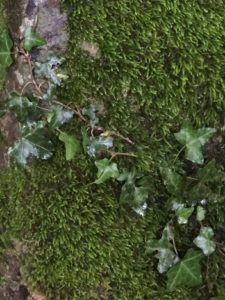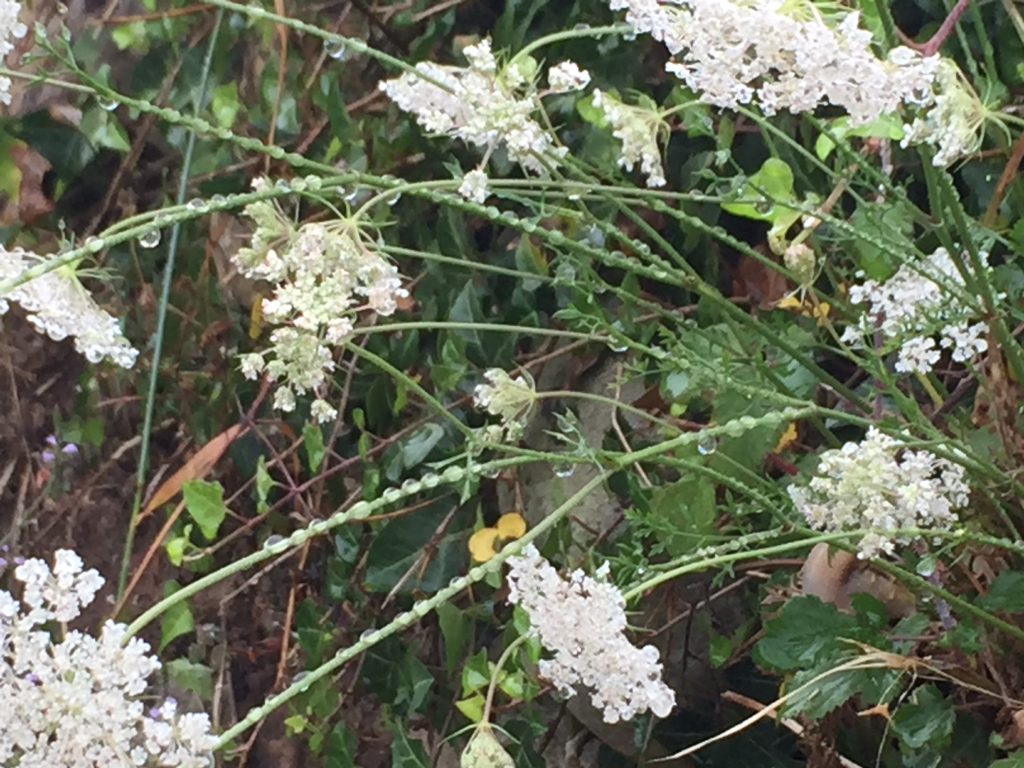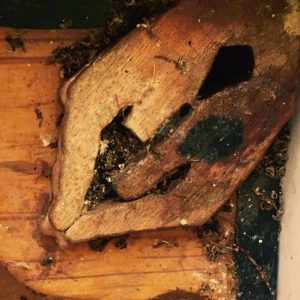my august colleagues
a mist
settled over the hills
and never let go
every thing
dripping with birdsong
and moss
August had arrived, warm and wet. A day for going under my hood, to remember all the pictures of yesterday; however, my freedom from Beata allowed space to meet Felix, a tall, thin, 30-year-old Spaniard who walked up beside me and began chatting. Tall and inexperienced in the world, earnest and thoughtful in his black glasses and wild black hair, he soon asked to walk along for a while.
Felix was changing careers and changing his life. He had just left his job, and just ended a relationship with a girlfriend. He was sincerely puzzled by the way that his acts of kindness and generosity had been interpreted as creating a debt owed. He told me he had given his girlfriend a simple gift, a gift he could easily afford on his fulltime IT job, an e-reader so she could read books as she traveled about. He thought it would make her happy. He thought he could make her happy, by giving her caring attention, thoughtful gifts, gifts of himself and his time.
“You didn’t do anything wrong, Felix,” I told him. “You just gave the right gifts to the wrong woman.” He considered this possibility for some time.
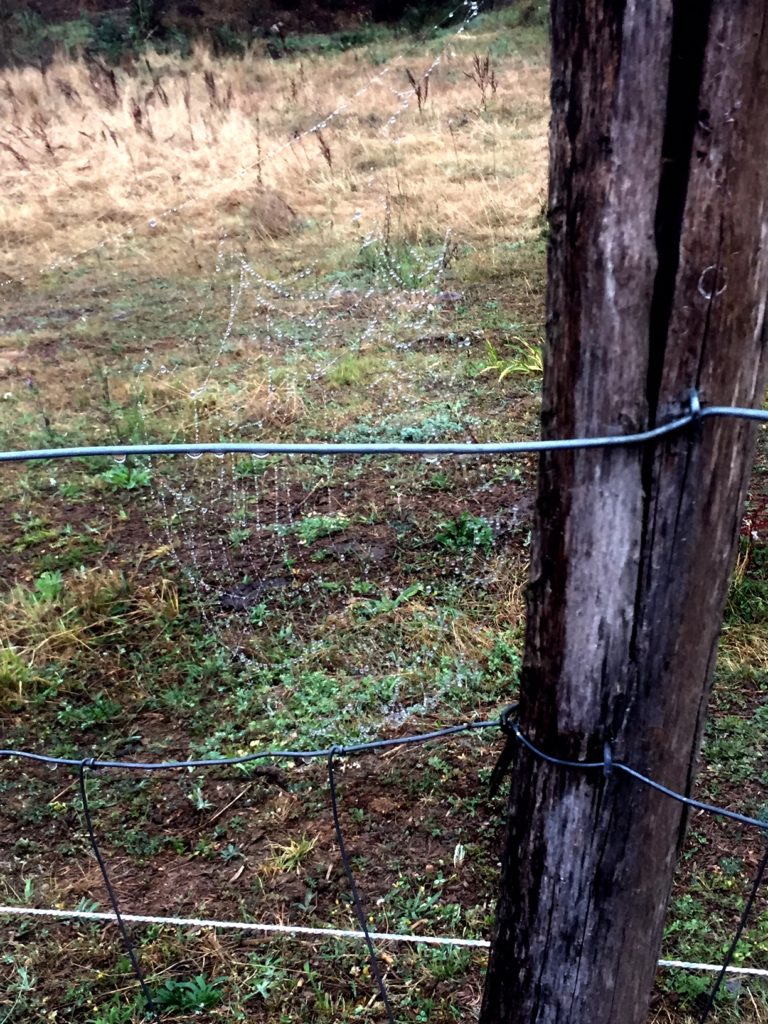 Felix was quirky. He minimally filtered his thoughts, words, and actions, which was both refreshingly endearing and odd, almost socially subversive at times, though in a harmless, delightfully Felix kind of way. He was back living with his parents while he enrolled in university, bound by obligation to his family, an uncomfortable fit after his fledgling independence. But it was plain from his stories that the dynamic would not last. Upon visiting an aunt’s home, the family sat awkwardly, hardly talking but disinclined to any other activity. “So I just left,” he said. “I told them, ‘See you later,’ and I went out. Was this wrong? But I could not stay there any longer.”
Felix was quirky. He minimally filtered his thoughts, words, and actions, which was both refreshingly endearing and odd, almost socially subversive at times, though in a harmless, delightfully Felix kind of way. He was back living with his parents while he enrolled in university, bound by obligation to his family, an uncomfortable fit after his fledgling independence. But it was plain from his stories that the dynamic would not last. Upon visiting an aunt’s home, the family sat awkwardly, hardly talking but disinclined to any other activity. “So I just left,” he said. “I told them, ‘See you later,’ and I went out. Was this wrong? But I could not stay there any longer.”
Without filters, we had rich conversation about our life choices, thoughts and feelings, and I found out how much he cared about the people around him, friends with depression, his own struggles. His new career choice: he was going back to school to become a nurse. When I asked him why not a doctor, he answered immediately, “Oh no, I do not want to be responsible for people’s lives. I just want to help them feel better. I want to be the person who pushes them in the wheelchair down the hall, telling them everything will be okay.” I constantly wanted to hug Felix.
Midday, we walked up a hill and found a peregrina eating her lunch at a picnic table beside the road, under a sheltering tree. Behind her, a fence kept the local cows from wandering away; they were having lunch as well, nibbling at the longer grasses in the fenceline.
She hailed us, and so we stopped to say hello and rest a moment. Her name was Joanna, and she was from Krakow. Joanna was one of those ageless people. She had an infectious, gap-toothed grin, a tiny space that reminded me of a legend I had read. The opening was said to be made when the spirit of God passed through the child as they were being born, creating the smile, the sign, of a holy person. She radiated love, and I began to wonder.
I asked her about her day’s trek, and her Camino destination, and she, too, planned to go all the way to Muxia. As we were comparing notes about how far to our evening’s albergue, Felix interrupted us mid-sentence to give us a news bulletin in a very serious voice.
“I think that one is pregnant!” He was bent down, pointing at one of the cows across the fence.
“Yes, I think so,” I confirmed, and then we resumed our conversation. Joanna smiled her lovely smile – and thus she was introduced to Felix.
* * * * * * * * * * * * * * * * *
By evening, we got to the albergue at Bodenaya, unique and quirky too, known for its communal meals and hospitality. The hospitalero DavÍd met us at the door to give us the unfortunate news that there was only one bed left.
“You have to take it,” I argued with Felix.
I turned to DavÍd. “It’s his first day on the Camino – he just started today. You still do communal dinners?”
“Oh yes,” DavÍd replied, smiling at Felix.
“This is my first Camino friend,” Felix told DavÍd, giving me a side hug. I felt like I was dropping him off for his first day of school.
“He has to stay with you,” I told DavÍd, nodding toward Felix.
DavÍd looked concerned and ducked into the albergue, saying, “Un momento, por favor.” When he returned, I saw that he was very emotional. He held a small yellow arrow pin in his hand.
“This – is for you,” he said to me with a quavery voice, tearing up. “Each day, I give one arrow to a pilgrim. You give – your friend – last bed,” and he broke down sobbing, hugging me. I hugged him back, patting his back. The only words I could think to say were, “So much love…so much love.” I knew they were the truest words; why not say them. I leaned into the embrace.
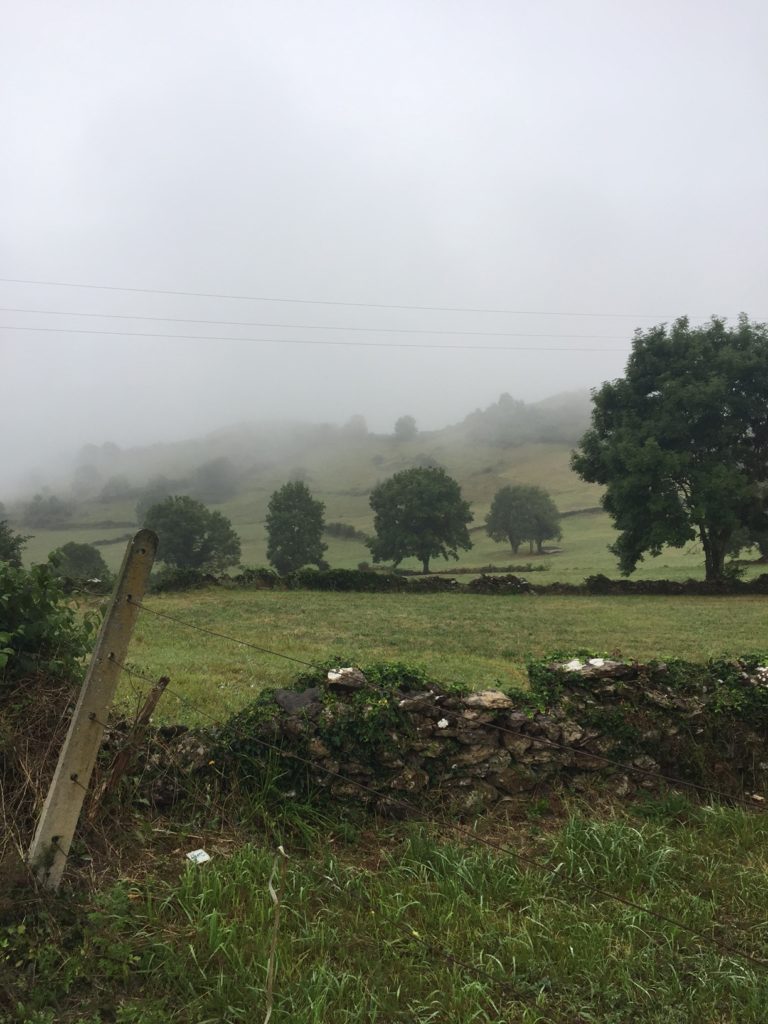 I walked on through the thickening mist, like carrying DavÍd’s tears and hugs with me. I reached the next albergue just as it was becoming too dark to see. An equally friendly hospitalero introduced me to Mauro, an Englishman with an Italian name.
I walked on through the thickening mist, like carrying DavÍd’s tears and hugs with me. I reached the next albergue just as it was becoming too dark to see. An equally friendly hospitalero introduced me to Mauro, an Englishman with an Italian name.
Mauro had gotten his name from his Italian father. He had traveled extensively, doing custom construction projects to fund his trips. We had a wonderful time talking and drinking sidra at the albergue. He invited me to dinner with him in the misty village just down the hill, and it was excellent – noodle soup, pork and potatoes, wine and bread, homemade flan for dessert.
We talked of our life choices and values, politics, the soaring feeling of cathedrals, writing and music, the satisfaction of living unconventional lives. Another interesting and intelligent person.
I felt so lucky to be meeting the most remarkable companions on my journey.
* * * * * * * * * * * * * * * * *
The next day, Felix caught up to me easily. We discussed the fact that, the following day, we would cross the high mountains of the Primitivo.
I was hoping for a wide open expanse, like a wilderness, a long view, though we were not far from anywhere here, really. I had written words I wanted to read aloud, three poems, and had transferred them into my pocket notebook. I had planned a ceremony, and as I turned it over in my mind, it felt right. I only told Felix that I would need to walk across the high part of the Primitivo alone, that it was important, and I would see him on the other side.
“Of course,” was his only reply, nodding.
Slow though we liked to walk, we were making excellent time, and decided to take a small detour to see the Santa Maria de Obona Monastery. According to my guidebook, it was founded in the eighth century, growing into a local economic and cultural center by the Middle Ages. At one point, during the 13th and 14th centuries, it became, “by order of royal privilege,” a mandatory stop along the Camino for all peregrinos.
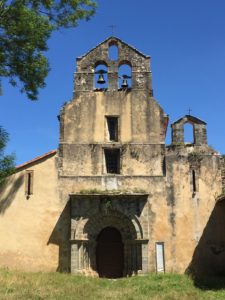 As we approached, whom should we see resting in the grass but Joanna. The man she had been walking with, named Christoph, had gone up the hill to the nearby village to see if a key to the church could be had.
As we approached, whom should we see resting in the grass but Joanna. The man she had been walking with, named Christoph, had gone up the hill to the nearby village to see if a key to the church could be had.
At the church itself, we found a sign that explained the monks had taught both formal classes in Latin, philosophy, and theology, as well as better agricultural practices to improve crops and livestock. The building was amazingly well preserved, an old Romanesque structure, solid, imposing.
We didn’t have long to wait before Christoph appeared, jingling a key from his fingers. We cheered, and thanked him for hiking up the steep road, but he only smiled and said, “Let’s have a look, shall we?”
Christoph’s wide smile, dark hair and beard looked familiar; he had been reading in a lower bunk at the schoolhouse albergue where Beata had been unable to stop talking. I felt momentarily embarrassed that he might think she was my chosen traveling companion at the time; then I realized, she was. In my mind, 17-year-old me threw up her hands, making a “get over yourself” face. People would just have to get to know me.
As I looked up from my seat in the grass, a calmer thought came unbidden: “This man wants to follow the path of a monk.” I didn’t say anything, but found it interesting. Maybe he looked like a monk. I, too, had had a similar desire, still considering a yearlong stay in a Buddhist contemplative center in New Mexico. I decided to honor the intuition, or at least respect it. Who knew who he might be.
Christoph opened the church, and we found ourselves in a small entry of utter darkness, separated from the world by a heavy wooden door. But one door further, and we stepped inside a great quietness.
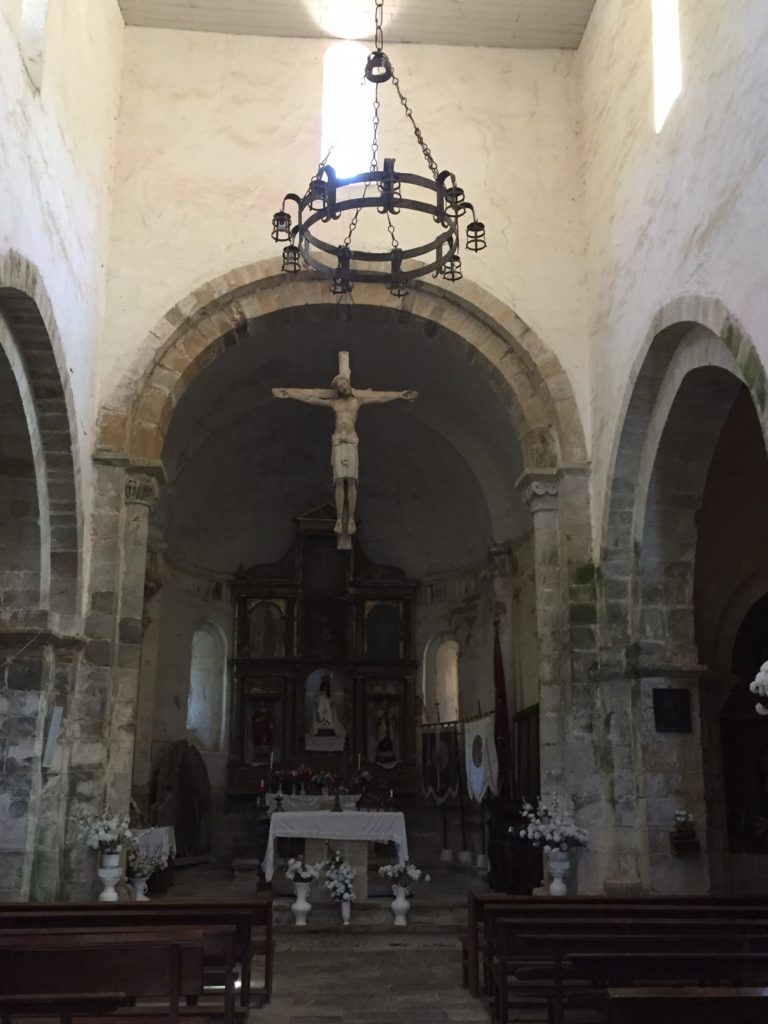 The stones stood silent. Christ hung on his wooden cross, floating above the central aisle, suspended in space and time, his face familiar as a fellow peregrino.
The stones stood silent. Christ hung on his wooden cross, floating above the central aisle, suspended in space and time, his face familiar as a fellow peregrino.
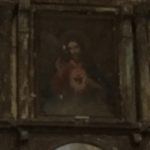 Behind him, a wooden altar held his mother, other saints, and his own painted image, his flaming sacred heart bursting forward from his chest in a golden aura, far more glorious than the halo encircling his head.
Behind him, a wooden altar held his mother, other saints, and his own painted image, his flaming sacred heart bursting forward from his chest in a golden aura, far more glorious than the halo encircling his head.
We slowly walked the interior, taking photos, silently awed by the power of this simple church. And then Felix became offended.
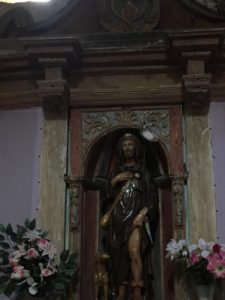 “That should not be there,” he said suddenly, showing Christoph and Joanna a packaged candy hung like a parasol on the elbow of San Roque, the saint who walked his own pilgrimage, to Rome. San Roque always lifted his robes to show he had an injured knee – the same knee I had scraped on a downhill slip one rainy morning. For me, he was the patron saint of skinned knees.
“That should not be there,” he said suddenly, showing Christoph and Joanna a packaged candy hung like a parasol on the elbow of San Roque, the saint who walked his own pilgrimage, to Rome. San Roque always lifted his robes to show he had an injured knee – the same knee I had scraped on a downhill slip one rainy morning. For me, he was the patron saint of skinned knees.
“That is not right, is it?” Felix now asked Christoph, who allowed that no, San Roque should probably not be holding a parasol of candy in the crook of his arm. So Felix removed it, and felt much better. He gave the candy to Christoph.
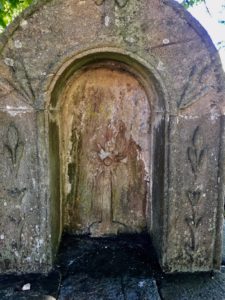 When we exited the church, Christoph locked it carefully and said he would return the key quickly. Felix offered to go with him. “I will bring us back beer,” he winked. And so, upon their return, we sat in the grass of what may have been the graveyard, under shady trees, near a tall carved stone that was maybe a grave marker or a fountain at one time, and drank golden cans of San Miguel beer, toasting each other and the Camino as we ate the stale chocolate found within the offering to San Roque.
When we exited the church, Christoph locked it carefully and said he would return the key quickly. Felix offered to go with him. “I will bring us back beer,” he winked. And so, upon their return, we sat in the grass of what may have been the graveyard, under shady trees, near a tall carved stone that was maybe a grave marker or a fountain at one time, and drank golden cans of San Miguel beer, toasting each other and the Camino as we ate the stale chocolate found within the offering to San Roque.
A more holy communion was never observed, as we sincerely and joyously wished each other salud and buen camino. The word “communion” means “sharing in common,” after all; and “holy” means sacred, and worthy of devotion. I had no idea at the time how true this would be.
Interpreting my photo of the informational sign later, it quoted an ancient document which noted payments to be made to the monks for their services: “servants should receive cider, if possible.” Amen.
* * * * * * * * * * * * * * * * *
In Campiello, a surprise luxury awaited – a bath. The two albergues had filled their common rooms quickly, so I was offered to share a double room. With Felix. Perfect. We both grinned at our good fortune.
We feasted at a huge peregrino dinner, set out on a long, long table, all together, recognizing and greeting each other, filling each other’s glasses and soup bowls. We delighted in each other’s jokes and songs, including a rousing “Feliz Cumpleaños” to a woman named Cordula, slowly finishing our meal over rice pudding, talking quietly out into the darkening evening. Mauro and Christoph had already met, and were deep in discussion. Joanna was beloved, hugged with joy by a young French couple, themselves newly and deeply en amor.
August is a time, and also a description of honor, meaning venerable, celebrated, esteemed. It can even mean hallowed, sacred. My respect and admiration for my fellow peregrinos was flowing like sidra, an endless waterfall of sparkling personalities and rich experiences. I’d had better moments with new friends here in one month than years at home, trying to connect, trying to maintain connection. Here, I was a peregrina. Here, I was European, if I liked. I was just one of them. Us. Here, I fit in, and felt honored to do so.
I looked down the table at Felix, so happy to sit with all the other young Spaniards, drinking and laughing. So much love. I felt a sense of preparation, cleansing and eating and drinking and enjoying community, before my long sola day in the mountains tomorrow. I stood watching the sunset color the sky before turning in.
I was carrying my own yellow arrow now, following myself, the map pressing itself into the lines of my imperfect and very human hands.
